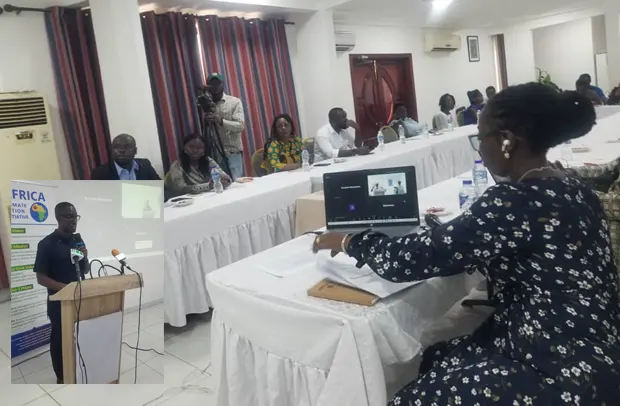Photograph of the round table discussion. INSET: Nana Yaw Ofori Agyei
THE AFRICAN Climate Action Initiative (ACAI) has raised awareness among Ghanaian policymakers, the EU, AU, and environmental NGOs in Ghana, on the environmental implications of current levels of meat consumption.
It further advocated for the integration of genuine meat pricing or tax policies into the climate change mitigation and climate finance strategies of Organisation for Economic Co-operation and Development (OECD) countries and China to reduce the consumption rate.
Speaking at the Pre-COP29 round table discussion on the Pricing of GHG Emissions from the Agri-food Sector of OECD Countries and China, Nana Yaw Ofori Agyei Executive Director, ACAI mentioned that the awareness creation will help Ghanaian policymakers, appreciate the grave implication on the environment.
“If you go to OECD countries that are Europe and North America and China, they consume a lot of meat, and Africa is suffering a lot on effect of climate change,” he said.
He said the integration of real meat pricing into climate policy would stimulate discussions on integrating real meat pricing or fiscal policies into global climate change mitigation strategies, intended to reflect the true environmental costs associated with meat production and consumption.
“The money that will come out of that will be used to finance climate adaptation and resilience in countries like Africa and Ghana as a whole,” he said.
“ The inclusion of real meat pricing mechanisms in national and international climate finance strategies will serve as a tool to promote sustainable food systems and contribute to climate resilience in Africa and globally,” he added.
Mr. Ofori Agyei further stated that the agri-food sector plays a significant role in global greenhouse gas emissions, and addressing this issue is crucial for achieving our climate mitigation and adaptation goals.
Mr. Ofori Agyei added that the collective contribution will help develop a deeper understanding of the potential impacts of carbon pricing on the agri-food sector and identify strategies for reducing emissions while ensuring the sustainability of food systems.
BY Prince Fiifi Yorke


